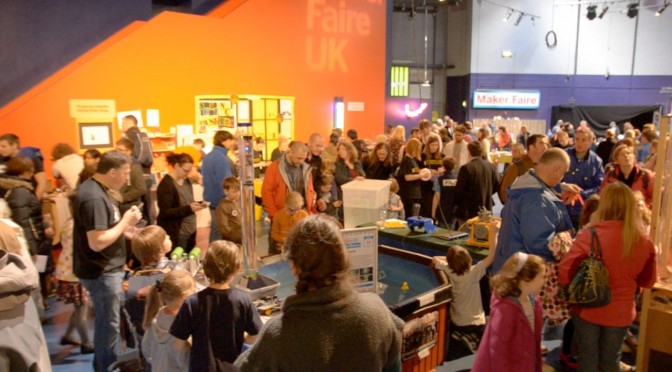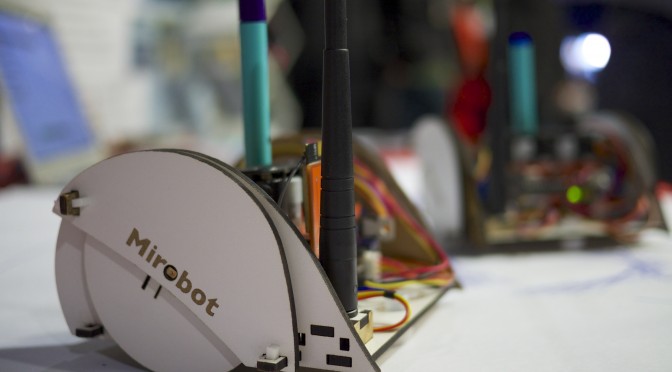At last week’s Science Communication Conference, I joined a plenary panel to discuss what’s changed in the 12 years the conference has been running. I’ve been kicking around in the sector for more like 25 years so I played a bit fast and loose with the timescale, but my little spot in the limelight went more-or-less as follows:
Tag Archives: maker faire
Is Mirobot the droid we’ve been looking for?
In the previous post I wrote about the challenge of catching and holding peoples’ attention with electronics and programming activities – if you’ve seen DEMO: The Movie you’ll know I’m quite big on attention.
The Arduino microcontroller platform is a terrific tool, but it’s hard to present a project which is both immediately appealing and instructive. Projects tend to be fun but complex, or useful-but-dry tutorials. As with many fields of life, I suspect the answer is: robots.
Frikkin’ robots.
Lots of robots.
Continue reading Is Mirobot the droid we’ve been looking for?
Arduino: first steps
Pick a random stall at Maker Faire UK and there’s a fair chance it’ll have flashing LEDs. And where there’s a flashing LED, there’s usually a little blue circuitboard driving it. The blue board is the famous Arduino, a family of open-source microcontrollers designed to allow easy interaction between code you write and real-world sensors and actuators.
There’s a complex and ever-expanding ecosystem of Arduino-compatible boards and interface units, and to a novice it’s all a bit overwhelming. I am that novice. Indeed, the list of Arduino projects I’ve completed looks like this:
- [insert list of future projects here]
However, awareness of what’s possible expands one’s set of available tools, and Arduino feels like the sort of thing I might, at some point, find useful. So every now and then I tinker a little. My tentative, toe-in-the-water approach to Arduino goes like this:
Riding BigTrak
A Rebel X-wing pilot driving a giant BigTrak is the most 1979 thing I’ve ever seen.
On the face of it this isn’t a very ScienceDemo sort of thing to do, but (a.) no, it really is, and (b.) over the next few days I’ll be posting a few things which caught my eye at this weekend’s Maker Faire UK. It was a wonderful weekend full of charming, talented and whimsical people… and that was before the Hitchen Hackspace guys let me drive their giant BigTrak. I’m the one in the purple hoodie in the film, grinning from ear to ear.
Genius.
Maker Faire UK
One reason for this site’s very existence is to try to connect the worlds of teaching and science communication. They have different needs and objectives, and they’ll use demos in different ways, but they’ll be the same demos.
So, teachers – here’s something from the world beyond the school lab, Maker Faire UK:
Maker Faire is very much its own brand of lunacy, but it captures something that for a specific type of geek is spectacularly good for the soul. And it turns out that type of geek is everywhere, in every field. The range of disciplines and the way they weave together (sometimes literally) is staggering. This year’s was the biggest UK Faire yet, with 10,000 visitors over the weekend.
I’m a huge fan of Maker Faire, and the softly-spoken, quietly-enthusiastic Dale Dougherty is a wonderful host.
MAKE | Maker Faire UK: Interview with Artist Giles Walker
I want ScienceDemo.org to be about demos, yes, but also about issues surrounding demos – how and why we do them, to whom, and to what end. So here we go. Make have an interview with a guy who’s exhibiting pole-dancing, CCTV-headed robots at Maker Faire UK this weekend. Worth a read:
One of the things we discuss rather a lot in science communication circles is how to shift science and engineering further into mainstream culture. While the likes of Festival of the Spoken Nerd are taking great strides, it’s still notable that, for example, the ‘Cultural Olympiad’ surrounding last year’s London Olympics laughed all over the idea that STEM could be ‘cultural.’
This is one of the reasons I think Maker Faire is important. I’ve said before that while many STEM engagement projects are about STEM as career choice, Maker Faire comes from a completely different community and set of sensibilities. If it’s about STEM at all, it’s about STEM as lifestyle choice.
Maker Faire is chaotic, noisy, messy, and more than a little bewildering. It’s also joyous, inspiring, friendly, and pleasantly challenging. In my opinion it should be required reading on scicomms MSc courses, precisely because of that anarchic joy – it’s what happens when you take similar ideas to public engagement but develop them with a completely different group of people coming from a completely different viewpoint. In many ways, I prefer their interpretation of how things could be.
There’s a danger, I think, of the Cheltenham Science Festival and its ilk coming to represent ‘authorised’ science communication, and anything else being regarded with an air of suspicion (sometimes, when I’m hanging out with the London scicomms set, I wonder if this has already happened). There’s an orthodoxy to the sector which risks becoming bland. Maker Faire is doing a different job for a different audience, but the approach is so radical I think everyone should see it. Yet the usual scicomms community is notable largely for its absence. What should be worrying for them, I think, is how little they’re missed.
We’re not going to take STEM into mainstream culture unless we take the cultural sector seriously, and come to understand it on its own terms. Maker Faire UK is by far the best place to see the collision and interaction of the ‘two cultures.’ It’s a huge hit regionally, but I wish more of the opinion-makers and leaders made the arduous journey north to see it for themselves, and have their assumptions challenged.
Maker Faire UK runs April 27/28th at the Centre for Life, Newcastle. Details.



